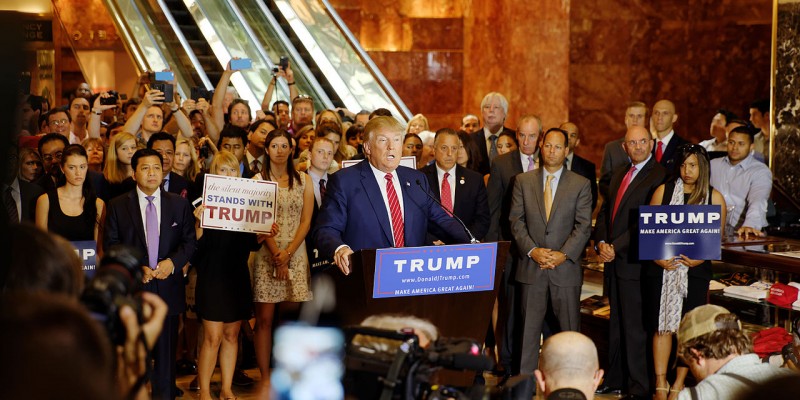What is the effect of free radical market to immigration? Benjamin Powell – economist of the Free Market Institute at Texas Tech University and curator of the recent The Economics of Immigration – in this interview criticizes the anti-immigrants propaganda of Donald Trump from an economic perspective. Are immigrants a burden for the society in which they arrive?
Is it right to be afraid of immigration from an economic point of view?
No, people should not be afraid of the economic impact of immigration. The pure economics of immigration is the same as that of goods and services. Both are based on the economic theory of comparative advantage, where trade between parties makes both better off and grows the economic “pie” in the process.
Who would gain from the situation?
Economists estimates of the potential global gains from open immigration are staggering. They range from 50% to 150% of World GDP. Much of these gains go to the immigrants themselves, but even economists who are against greater immigrant flows, generally admit that the general population gains economically from immigration too. Most studies find no general negative impact of immigration on wages or on the number of jobs for citizens.
How “Market-Based Approaches” (to quote part of the title of your last book) can help to solve the issue of immigration?
A true international free market in labor would place no quantitative or qualitative restrictions on international migration, apart from any minimal requirements to screen out known criminals, terrorists, and those with serious contagious diseases.
To discourage the demand for asylum, Denmark and Switzerland asked for money to the refugees. What do you think of this kind of decisions?
I think it is unnecessary. In general, the biggest problem Europe faces from refugees are laws that make it difficult or impossible for refugees to work. Rules that prohibit refugees from working should be abolished. Laws that make worker dismissal difficult impose a disproportionate burden on immigrants, making it unlikely that many who are eligible to work will be hired in the first place. Similarly, high minimum wages also effectively shut low skilled immigrants out of labor markets. If these laws are changed to allow greater workforce participation by immigrants, then destination countries wouldn’t have to subsidize them and there would be no need for a fee.
Out of Poverty and Making Poor Nations Rich are titles of your books. They sounds like the premises of some results we find in The Economics of Immigration. Can you explain your recipe?
Good institutions that protect private property, enforce the rule of law, and grant a large degree of economic freedom are the fundamental cause of prosperity. Most immigrants come from countries that lack these institutions, so that their own human capital isn’t used as well as it could be. When they migrate to a country with these good institutions, their incomes soar, as they are better positioned. It is hard – or impossible – to transplant these good institutions to poorer countries. The best we can probably do is allow more of these poor people, who are trapped in lousy environments by accident of birth, to migrate to places with better institutions.
Donald Trump is a factor in the race to the White House. And he drains much consensus thanks to his op-ed on immigration, refugees and illegal migrants. What do you think of the op-ed of Trump on immigration?
Donald Trump is an “economic ignoramus”. His op-ed about the economic impact of immigration and international trade are completely off base and not at all based on findings in social science. For example, according to Trump, «the influx of foreign workers holds down salaries and keeps unemployment high for non-immigrants». In contrast, scholars who study the economic impact of immigration find that newcomers have had zero effect on the employment and compensation of workers overall.
Open Migration published an article on the positive impact of immigrants on the Italian pension system. Taxes paid by immigrants support about 600,000 people’s pensions in Italy. How do you judge the impact of immigrations on the taxes system?
This will depend on the country and how you measure it. Good studies take account of the dynamic effect immigration has on the economy when estimating immigration’s fiscal impact (for example counting increased taxes paid by an employer who makes higher profits by hiring an immigrant), and track the taxes paid vs services consumed in current and future periods, by both the migrants and their offspring. When it comes to the United States, the studies that do these things sometimes find tax gains and sometimes tax drains, but the estimates are small and all clustered around zero.










